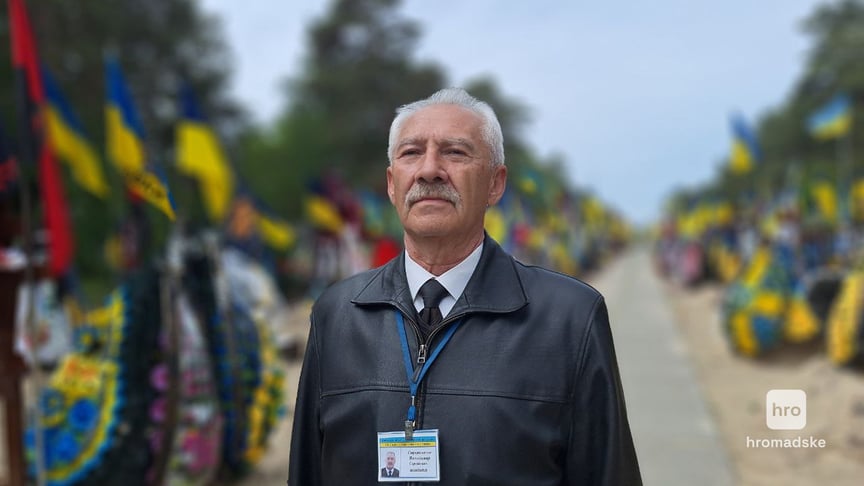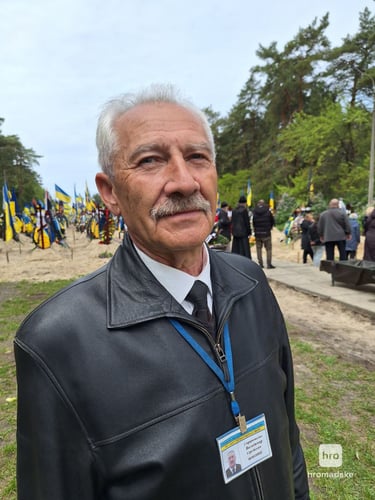Bridging two worlds: 45 years of work at a cemetery

Three gunshots are heard. The birds’ chirping stops. My heart lurches and sinks. The birds recover faster than I do, resuming their song. The air is sharp with lilac and death.
A funeral. Relatives and friends in tears. Soldiers with stern, somber faces carry the coffin, place it by the grave, and cover it with a flag, honoring their fallen brother-in-arms.
Among the small procession of about 50 people, a tall, gray-haired man in an old-fashioned black leather jacket stands out. He exudes calm and confidence. This is Volodymyr Stratonenko, the funeral organizer, or, as they call it, the master of ceremonies.
In 45 years, he has laid over 20,000 people to rest.
Now I bury only soldiers
We meet in the morning near Kyiv’s central military hospital. Volodymyr Serhiyovych, 73, leads me to the morgue. Today, they’ll bury a 49-year-old soldier who fought from the war’s first days.
“Did he die in the hospital from wounds?” I ask.
“He was killed on the front, during a combat mission,” he says instructively. His gray mustache frames kind eyes, once blue. “They bring both those killed in action and those who died in the hospital from wounds. Over there’s the refrigerated truck,” he gestures toward a building hidden by lush green bushes.
“How did you prepare for today?”
“Yesterday, I called his mother, asked about him. He’s divorced; we don’t know if his kids will come. Before, I’d give a full biography in my speeches—birthplace, education, achievements—but now I keep it short. Why? People used to die mostly in their ‘70s or ‘80s; their deaths were natural, less shocking. But when a 25-year-old is drafted and killed two months later… It’s hard for families to hear long speeches. Lately, all my deceased are like that. Only soldiers.”
Soldiers from the Territorial Recruitment and Social Support Center arrive at the morgue courtyard. Stratonenko greets the military commissar like an old friend. A black hearse van is ready, its rear doors open to receive the coffin. We wait for the soldier’s mother, who’s a few minutes late.
Volodymyr Serhiyovych wears a badge with the name of Kyiv’s state municipal funeral service, which provides ritual services: transport, coffins, gravediggers, wreaths. Below the acronym: his name and the word “organizer.” He asks the soldiers to carry out the coffin after the mother says goodbye in the ritual room.
Here she is—a short woman with a face swollen from tears, supported by a friend carrying yellow roses and white chrysanthemums. Stratonenko leans toward them, asking if someone arranged stools at their building’s entrance, as they’ll stop there for neighbors to pay respects. He asks if the mother wants to place personal items in the coffin. She gasps:
“Oh, I forgot!”
“No worry, you can get them at home,” he reassures, taking a towel from her and tying it to the cross, ensuring the prayer embroidered on it is visible.
In the ritual room—gray diamond-patterned wallpaper, an icon on the wall—he joins the mother and her friend. With practiced hands, he arranges the flowers in the coffin in a row neatly, not in a pile.
“My role isn’t just to say nice words but to oversee everything, guide people. I asked the guys to carry the coffin, though they know when to play the anthem or hand the flag to the family,” he tells me.
We sit by the driver; the mother and her son are in the back. She’s taking him home one last time.
The only condition for an intern is to show up
Volodymyr Stratonenko graduated from Kyiv University (now Shevchenko), an engineer-radiophysicist and researcher. He worked there until his father’s death, when, at 27, he handled the burial and met an official who offered him a job heading the city’s new funeral service.
“I told the guy I had no idea what that was. ‘Say a good word about the deceased,’ he said. I don’t know why he chose me. Maybe because I was young, handsome. Now I’m just handsome,” he chuckles.
The salary lured him: 240 rubles versus 115 at the university, plus the promise of tips, a Ukrainian custom.
“I remember my first funeral, a militia colonel,” he recalls. “Reading the text, my leg was shaking, tapping away. There were many officers. The smell from the body was strong; in the bus, we didn’t know where to hide. My wife kept asking why I doused myself in cologne. Now, with embalming injections, bodies are odorless, like oak. I’ve gotten used to speaking; I can talk about anyone without notes.”
Before, funeral workers loitered at cemeteries, offering speeches to grieving families. Later, organizers were offered directly at the funeral service, where people ordered supplies.
Work was relentless: Stratonenko went years without days off, handling two funerals daily. Before mobile phones, organizers visited clients’ homes to plan. They knew Kyiv as well as taxi drivers. Now, they call.
Daily briefings are gone; tasks come via phone. He shows me tomorrow’s schedule on Viber: four organizer bookings. Only four work in the state service now, down from 49. The rest fled to private firms in the ‘90s for better pay.
His salary, after taxes, is 7,000 hryvnias ($169). It’s fine for a pensioner, but youth won’t come.
“Getting a job here was once impossible—a juicy gig. You needed a degree. They cared for us: tailored suits, diction courses. I have a leather folder with an SBU emblem, a gift. Now I buy my own clothes, all black. We’ll take anyone who shows up—that’s the only condition,” he smiles.
Karma for disrespect
The hearse brakes suddenly. A young woman in a fancy car cuts us off, exchanging gestures with our driver. She doesn’t see the soldier’s portrait in the windshield, though it’s large.
Our driver, Mykola, tries to point it out, but she cuts us off again.
“It’s common in Kyiv,” Stratonenko sighs. “In villages, everyone stops for a funeral. Here, not so. She’ll face trouble later and wonder why. Karma catches up. As the saying goes: you shouldn’t cross a deceased’s path. It’s about respect.” He speaks softly so the mother doesn’t hear.
We pull into the apartment complex’s courtyard, packed with cars. One blocks the entrance.
“Sometimes relatives post notices to clear cars for a funeral. I don’t know why it’s like this here. Maybe a neighbor parked and left for work,” Stratonenko says.
The coffin is placed on stools. Neighbors and friends gather. Stratonenko loudly asks for flowers, adjusting them. While two priests perform the memorial rite, he stays quiet. He gestures to stop a late, tearful elderly couple from laying flowers until after the service.
From the ritual room to the home farewell and cemetery, he gives clear instructions: where to place bread, how to position the lid, who carries the portrait, when to say goodbyes, and who goes first.
Without him, it would feel chaotic and drawn out.
His actions are precise, instructions polite, demeanor humane. He offers a hand, helps into the bus, and warns about drafts.
The soldier was buried at Lisovyi Cemetery, on the Alley of Heroes—a long stretch with nearly 1,000 graves. A sea of flags, flowers, photos of young faces. A sea of death.
A pleasant job: Fresh air, flowers, orchestra
Over 45 years, Stratonenko buried officials, MPs, their relatives. He names the mothers of ex-President Viktor Yushchenko and former Kyiv mayor Leonid Chernovetskyi, and handled funerals for ministers Yuriy Kravchenko, Heorhiy Kirpa, and surgeon Oleksandr Shalimov. Recently, he buried soldier Vasyl Ratushnyi, brother of slain soldier and activist Roman Ratushnyi.
A respected figure, he’s been invited to cities and recommended like a wedding host.
“Only that’s a joyful event, and this is sad,” he jokes.
He’s seen all kinds of funerals but dislikes recalling them, trying to forget each one. “If I kept it all in my heart, I’d be long gone.”
“My wife says I have nerves of steel. I sleep fine. But our female workers have dreams of the deceased visiting them at night.”
“The key in our job is calm,” driver Mykola chimes in. “It’s grief for others, work for us. In taxi driving, I was choked, stabbed, and vomited on. This is better. But when girls learn where I work, they say, ‘No way.’”
Black humor from the funeral team: “It’s a pleasant job. Fresh air, flowers, orchestra.”
Some cases stick with Stratonenko. Once, a mother’s son vanished. They searched hospitals, morgues, found and identified him, and planned the funeral. Then the son showed up—he’d been with a girl for days. The mother barely recovered.
“Good thing he appeared on burial day,” Stratonenko says. “Later, we’d have had to exhume a stranger. Exhumation is tedious.”
Another time, a deceased’s sister fell ill at the funeral, was hospitalized, and soon Stratonenko buried her too.
“I can’t handle kids’ funerals; I avoid them unless personally asked. A 5-year-old girl fell from a window once—it was awful. When someone’s lived a full life, everyone’s calmer; it’s natural. Now it’s reversed: kids bury parents, and we bury young soldiers, the nation’s best.”
He now handles only military funerals. Private agencies chase civilian ones, milking families for profit. Since Territorial Recruitment Centers cover military funeral costs and are state-run, they work with the state funeral service.
Today’s four-hour organizer service costs 506 hryvnias ($12), plus 122 ($3) for the home stop.

I am not afraid of death
On the way to the cemetery, Stratonenko glances at his folder, reviewing printed and handwritten notes, blending past speeches for today.
“When I’ve attended funerals as a guest, not a worker, I noticed mistakes. I dislike empty phrases, pompous speeches. I try to keep it human,” he admits.
His graveside speech is flawless—no notes, loud, solemn. The funeral’s culmination, it’s dignified.
I ask how long he plans to stay in the funeral service.
“October marks 46 years. If I reach 50, great. I never complained about my health, but a few months ago, I fell ill. My wife sent me to the doctor. Turns out, I’d had a heart attack on my feet, with a big scar. Had surgery, came back to work. I skip wakes now; they’re tough. You’re not just drinking—you’re hosting. I liked teachers’ and intellectuals’ funerals; they appreciate good words. When it’s just drinking and toasting ‘to the deceased’s health,’ it’s not right,” he laughs.
He has a daughter, son, and three grandchildren.
“God blessed me with them for my grim mission. They’re wonderful. I don’t fear death. When you deal with it daily, you get used to it. We’ll all be there, but the later, the better.”
- Share:

